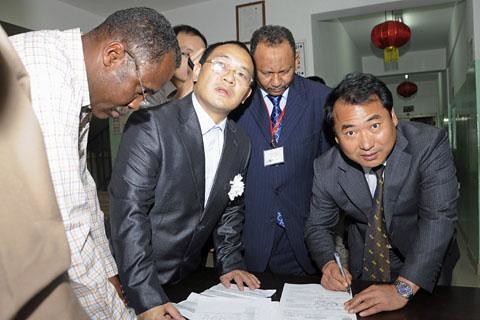
Members of the Chinese embassy in Sudan sign handover papers to receive the body of a worker killed in the kidnapping of specialists who were abducted by South Sudan rebels fighting the government in Khartoum. Despite the partition, fighting continues., a photo by Pan-African News Wire File Photos on Flickr.
8 January 2014
Last updated at 11:02 ET
China's oil fears over South Sudan fighting
By Yuwen Wu
BBC Chinese
The stakes could not be higher for China, the largest investor in South Sudan's oil sector, as fierce fighting continues between forces loyal to President Salva Kiir and those of his former deputy.
Some of the largest oil fields China operates are in areas controlled by fighters backing Riek Machar, the country's vice-president until he was sacked in July.
Oil production has already dropped by 20% since the onset of the conflict three weeks ago and more than 300 Chinese workers have been evacuated.
The spectre of their Libyan experience also weighs heavily on the Chinese minds - project after project now lies deserted because of heavy fighting during the western-backed counter-revolution of 2011, inflicting huge losses on China.
It is no surprise then that China is putting its full weight behind the peace talks in Addis Ababa.
Foreign Minister Wang Yi was in the Ethiopian capital on Monday and made it clear that China wanted both sides to stop fighting and seek a reasonable and rational way out.
According to media reports, he was even willing to mediate personally between the warring sides.
It is unclear if Mr Wang has been able to do this, but his message was important, reports the BBC's Emmanuel Igunza from Addis Ababa.
It demonstrates how seriously the international community is taking the crisis - with many diplomats present at the talks, he says.
Apart from China's Africa envoy Zhong Jianhua, US special envoy Donald Booth and EU special representative Alexander Rondos are also attending.
Fraught with risk
China invested some $20bn (£12bn) in Sudan before it split into two countries in 2011, according to Chinese media reports.
Another $8bn was pledged to President Kiir during his visit to China the year following secession, to be used for infrastructure projects and the oil sector.
The heavy investment seems to have borne fruit, as in the first 10 months of 2013, China imported 1.9 million tonnes of oil (nearly 14 million barrels) from South Sudan, twice as much as China imports from Nigeria each year.
Though amounting to less than 1% of China's total oil imports, it makes up roughly two-thirds of oil exported by the world's youngest nation and is expected to increase.
Two years ago, China suffered heavy losses in its Libyan projects, including infrastructure, telecommunications and oil.
Many constructions were halted and sites looted or destroyed during the counter-revolution which toppled long-time leader Muammar Gaddafi.
The total loss was estimated by several Chinese media reports to be in the region of $20bn, although no official figures exist.
Compensation talks with the new Libya government stalled as their priority was very much on nation-building and improving the living conditions of the Libyan people.
Economic boom
Experts point out that China has taken tremendous risks in its search for oil.
This is because the country's economic boom continues to require a great deal of oil - home production is limited and reliance on exports reached 56% in 2012.
But all the known global markets have been dominated by Western companies or have been off-limits because of sanctions, leaving China with little choice but to adopt high-risk strategies.
Nowadays, more than half of China's investment in the overseas oil sector is found in other areas, including Iran, Nigeria, Sudan, South Sudan and Venezuela.
Chinese workers have been caught in the conflicts for control of oil by various forces in Sudan.
In 2008, five Chinese oil workers kidnapped by rebels in Sudan's South Kordofan province were killed during a rescue attempt.
Four years later, another 29 Chinese construction workers were abducted in the same province and were only released 11 days later after intense negotiations.
The Sudanese rebels were quoted as saying that they did not want to harm the workers, but they aimed to send a signal to the Chinese government that they did not want them to be involved in the conflict over oil in Sudan.
But what is currently happening in South Sudan seems far more serious than kidnappings.
China must be praying for a quick end to the trouble so life on the oil fields can return to normal.
In the meantime, some experts also predict that China might be forced into re-thinking its high-risk oil strategy.
No comments:
Post a Comment